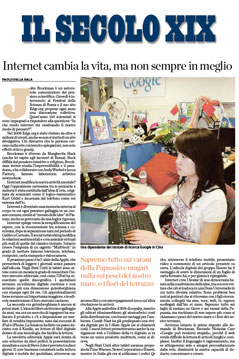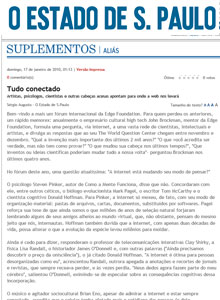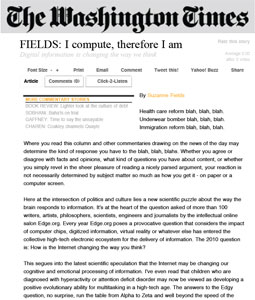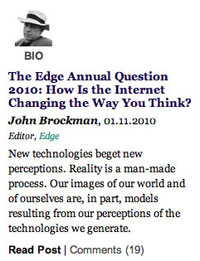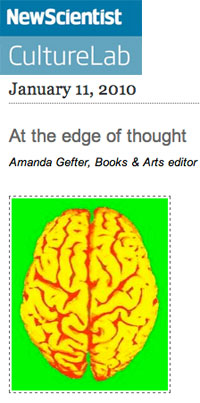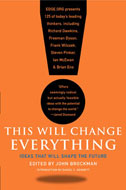|
The Edge Annual Question — 2010 HOW IS THE INTERNET CHANGING THE WAY YOU THINK? Read any newspaper or magazine and you will notice the many flavors of the one big question that everyone is asking today. Or you can just stay on the page and read recent editions of Edge ...
What do you think? This year's Question is "How is the Internet changing the way YOU think?" Not "How is the Internet changing the way WE think?" We spent a lot of time going back on forth on "YOU" vs. "WE" and came to the conclusion to go with "YOU", the reason being that Edge is a conversation. "WE" responses tend to come across like expert papers, public pronouncements, or talks delivered from stage. We wanted people to think about the "Internet", which includes, but is a much bigger subject than the Web, an application on the Internet, or search, browsing, etc., which are apps on the Web. Back in 1996, computer scientist and visionary Danny Hillis pointed out that when it comes to the Internet, "Many people sense this, but don't want to think about it because the change is too profound. Today, on the Internet the main event is the Web. A lot of people think that the Web is the Internet, and they're missing something. The Internet is a brand-new fertile ground where things can grow, and the Web is the first thing that grew there. But the stuff growing there is in a very primitive form. The Web is the old media incorporated into the new medium. It both adds something to the Internet and takes something away." This year, I enlisted the aid of Hans Ulrich Obrist, Curator of the Serpentine Gallery in London, as well as the artist April Gornik, one of the early members of "The Reality Club" (the precursor to the online Edge) to help broaden the Edge conversation — or rather to bring it back to where it was in the late 80s/early 90s, when April gave a talk at a "Reality Club" meeting, and discussed the influence of chaos theory on her work, and when Benoit Mandelbrot showed up to discuss fractal theory and every artist in NYC wanted to be there. What then happened was very interesting. The Reality Club went online as Edge in 1996 and the scientists were all on email, the artists not. Thus, did Edge surprisingly become a science site when my own background (beginning in 1965 when Jonas Mekas hired me to manage the Film-Makers' Cinematheque) was in the visual and performance arts. 172 essayists (an array of world-class scientists, artists, and creative thinkers) have created a 132,000 document. (Click here to go directly to the responses). The are:
John Brockman
|
| CONTRIBUTOR INDEX | COMPLETE TEXT OF RESPONSES |
|
|
A BIG QUESTION: 'HOW IS THE INTERNET CHANGING THE WAY YOU THINK?'
|
|
ON THE COVER |
|
In 1953, when the internet was not even a technological twinkle in the eye, the philosopher Isaiah Berlin famously divided thinkers into two categories: the hedgehog and the fox: "The fox knows many things, but the hedgehog knows one big thing.” Hedgehog writers, argued Berlin, see the world through the prism of a single overriding idea, whereas foxes dart hither and thither, gathering inspiration from the widest variety of experiences and sources. Marx, Nietzsche and Plato were hedgehogs; Aristotle, Shakespeare and Berlin himself were foxes. Today, feasting on the anarchic, ubiquitous, limitless and uncontrolled information cornucopia that is the web, we are all foxes. We browse and scavenge thoughts and influences, picking up what we want, discarding the rest, collecting, linking, hunting and gathering our information, social life and entertainment. The new Apple iPad is merely the latest step in the fusion of the human mind and the internet. This way of thinking is a direct threat to ideology. Indeed, perhaps the ultimate expression of hedgehog-thinking is totalitarian and fundamentalist, which explains why the regimes in China and Iran are so terrified of the internet. The hedgehogs rightly fear the foxes. Edge (www.edge.org), a website dedicated to ideas and technology, recently asked scores of philosophers, scientists and scholars a simple but fundamental question: "How is the internet changing the way you think?” The responses were astonishingly varied, yet most agreed that the web had profoundly affected the way we gather our thoughts, if not the way we deploy that information. |
Internet | Edge, the high-minded ideas and tech site, has posed its annual question for 2010 — "How is the Internet changing the way you think?" — and gotten some interesting responses from a slew of smart people. They range from the technology analyst Nicholas Carr, who wonders if the Web made it impossible for us to read long pieces of writing; to Clay Shirky, social software guru, who sees the Web poised uncertainly between immature "Invisible High School" and more laudable "Invisible College." David Dalrymple, a researcher at the Massachusetts Institute of Technology, thinks human memory will no longer be the key repository of knowledge, and focus will supersede erudition. Quote:
[...] |
|
Deep Thinkers Debate: 'How Is the Internet Changing the Way You Think? Edge is an organization of deep, visionary thinkers on science and culture. Each year the group poses a question, this year collecting 168 essay responses to the question, "How is the Internet changing the way you think?" In answer, academics, scientists and philosophers responded with musings on the Internet enabling telecommunication, or functioning as a sort of prosthesis, or robbing us of our old, linear" mode of thinking. Actor Alan Alda described the Web as "speed plus mobs." Responses alternate between the quirky and the profound ("In this future, knowledge will be fully outside the individual, focus will be fully inside, and everybody's selves will truly be spread everywhere.") Since it takes a while to read the entire collection--and the Atlantic Wire should know, as we tried--here are some of the more piquant answers. Visit the Edge website for the full experience. For a smart, funny answer in video form, see here.
[...] |
|
a cura di Clara Caverzasio Tanzi e Gaetano Prisciantelli |
|
|
Science THEORY AND PRACTICE BRAIN TRUST "Between Possible and Imaginary" is the theme of the Science Festival which opens in Rome next week. The American popularizer John Brockman collected the forecasts of the greatest living minds about ideas that will change everything during their lifetime. From DNA to education, the book illustrates surprising and provocative discoveries from the world that await us. [GAETANO PRISCIANTELLI] |
|
|
|
The Question of 2010 On that Friday in January 2010 published by the American literary agent John Brockman, the question of 2010: How the Internet and networked computers to change the way we think? At the core of the debate lies the question asked by science historian George Dyson: "Is the price of machines that think, people who will not do?" Brockman, who counts some of the most important scientists of our time as his authors, this vision orbits on Edge.org with one hundred twenty-one answers. We print the most interesting in the features section. Unlike Germany, where the debate about the information age is still focused on palaver about media, Edge debates the target in depth. Who is planning what, where, by what means? If one takes the digital revolution seriously , one must ask to what degree the communication of the industrialized twenty-first century will change our thinking. The computer pioneer Daniel Hillis describes how even such a simple procedure such as the programming of the time on networked computers is now barely understood by many programmers. And he concludes, with regard to climate change and financial crisis: "Our machines are embodiments of our reason, and we entrust them with a large number of our decisions. In this process we have created a world that is beyond our understanding. Experts no longer talk about data, but about what computers predict with the data." Neurobiological effects of constant multitasking lead, as Nicholas Carr writes about outsourcing, for ever-increasing dependence on computers. What if not only decisions about loans and budgets were subject to the use of computers, but also those regarding resumes? After the recent incidents in America, profiling is an even more important means of web-based "pre-crime" analysis: Who is planning what, where, by what means? But profiling what works with terrorists can also be applied to in enterprises and workplaces as Cataphora.com has shown. Been overtaken by reality Some of those authors presented by Brockman do not find that the Net has changed their thinking. Others see it differently. Nobody, not even the skeptics, long to return to a time before the Internet. But many make it clear that what we experience as a user is in fact only a "surfing", a movement on the surface. The German Internet debate is stuck in the nineties. Brockman's question this year sets the chord for questions that take us beyond this set of attitudes. Frank Schirrmacher |
|
FRONT PAGE PUBLICO (LISBON) — WEEKEND MAGAZINE — COVER STORY Do you think the Internet has altered you mind at the neuronal, cognitive, processing, emotional levels? Yes, no, maybe, reply philosophers, scientists, writers, journalists to the Edge annual question 2010, in dozens of texts that are published online today Click here for PDF of Portuguese Original In the summer of 2008, American writer Nicholas Carr published in the Atlantic Monthly an article under the title Is Google making us stupid?: What the Internet is doing to our brains, in which highly criticized the Internet’s effects on our intellectual capabilities. The article had a high impact, both in the media and the blogosphere. Edge.org – the intellectual online salon – has now expanded and deepened the debate through its traditional annual challenge to dozens of the world’s leading thinkers of science, technology, thought, arts, journalism. The 2010 question is: “How is the Internet changing the way you think?" They reply that the Internet has made them (us) smarter, shallower, faster, less attentive, more accelerated, less creative, more tactile, less visual, more altruistic, less arrogant. That it has dramatically expanded our memory but at the same time made us the hostages of the present tense. The global web is compared to an ecosystem, a collective brain, a universal memory, a global conscience, a total map of geography and history. One thing is certain: be they fans or critics, they all use it and they all admit that the Internet leaves no one untouched. No one can remain impervious to things such a Wikipedia or Google, no one can resist the attraction of instant, global, communication and knowledge. More than 120 scientists, physicians, engineers, authors, artists, journalists met the challenge. Here, we present the gist some of their answers, including Nicholas Carr’s, who is also part of this online think tank founded by New-York literary agent John Brockman. If you have more time and think your attention span is up to it, we recommend you enjoy the whole scope of their length and diversity by visiting edge.org. |
|
The online magazine Edge asked scientists, writers and artists, such as the Internet has changed their thinking. The answers are remarkable. ... Two billion people worldwide use the Internet. The debates about the new technology, however, are not the same everywhere. In Germany, for example, the discourse is limited on the subject of the net, as it is especially focused on media and copyright debates. The publication of the book "Payback", co-editor Frank Schirrmacher, co-editor of Frankfurter Allgemeine Zeitung presents the German debate, giving the topic the the depth it deserves. Prior to the publication Schirrmacher 's book, the American literary agent John Brockman, interviewed him for Edge.org, the online science and culture magazine. Schirrmacher, in his book, also asked the question — Has the Internet changed thinking? Brockman has now taken up this issue, and formulated it as his fundamental question, which he asks at the end of each year of the scientists and authors who discuss and publish on Edge. The answers have now been published on Edge.org. The authors are 131 influential scientists, authors and artists. |
|
|
|
Schirrmacher-Debatte |
|
|
|
|
[...] |
|||||||
|
Sharon Begley Shortened attention span. Less interest in reflection and introspection. Inability to engage in in-depth thought. Fragmented, distracted thinking. The ways the Internet supposedly affects thought are as apocalyptic as they are speculative, since all the above are supported by anecdote, not empirical data. So it is refreshing to hear how 109 philosophers, neurobiologists, and other scholars answered, "How is the Internet changing the way you think?" That is the "annual question" at the online salon edge.org, where every year science impresario, author, and literary agent John Brockman poses a puzzler for his flock of scientists and other thinkers. ... |
|
Articles of Note: John Brockman’s Edge question for 2010 asks over a hundred intellectuals, “Is the Internet changing the way you think?”... more» |
|
'CHANGE' LOOKS AT POSSIBILITES OF OUR FUTURE BY CARLO WOLFF I flunked a physics test so badly as a college freshman that the only reason I scored any points was I spelled my name right. Such ignorance, along with studied avoidance of physics and math since college, didn’t lessen my enjoyment of This Will Change Everything, a provocative, demanding clutch of essays covering everything from gene splicing to global warming to intelligence, both artificial and human, to immortality. Edited by John Brockman, a literary agent who founded the Edge Foundation, this is the kind of book into which one can dip at will. Approaching it in a linear fashion might be frustrating because it is so wide-ranging. ... ...Overall, this will appeal primarily to scientists and academicians. But the way Brockman interlaces essays about research on the frontiers of science with ones on artistic vision, education, psychology and economics is sure to buzz any brain. Stewart Brand, the father of the Whole Earth Catalog, a kind of hippie precursor of hypertext and intermedia (the last term is a Brockman coinage), calls Brockman "one of the great intellectual enzymes of our time” at www.edge.org, Brockman’s Web site. Brockman clearly is an agent provocateur of ideas. Getting the best of them to politicians who can use them to execute positive change is the next step. |
|
THE EDGE ANNUAL QUESTION BOOK SERIES "An intellectual treasure trove"
|
| CONTRIBUTOR INDEX | COMPLETE TEXT OF RESPONSES |



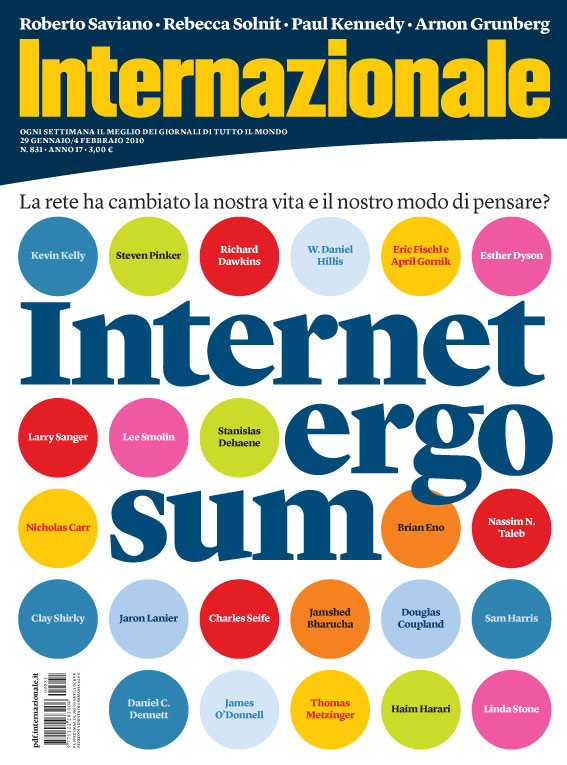








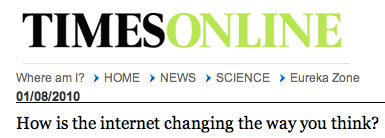
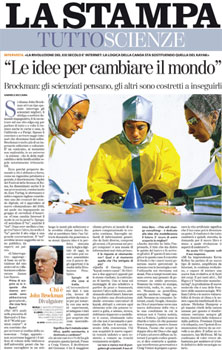
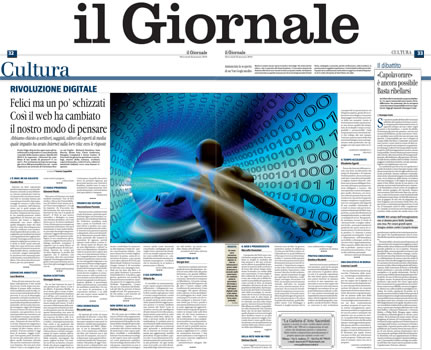
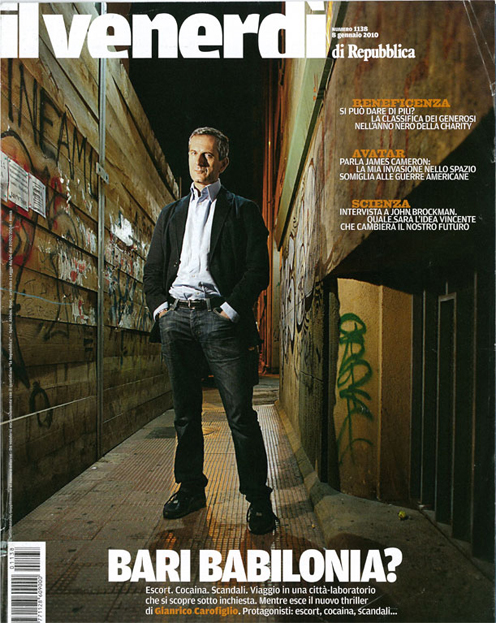
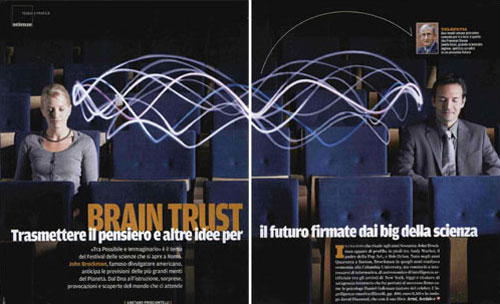
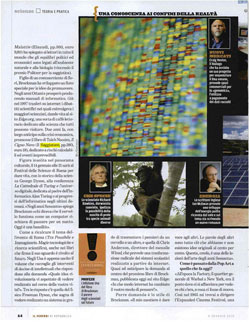
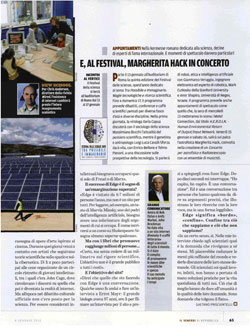
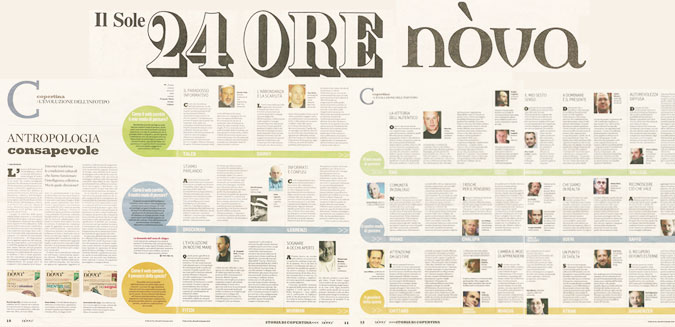




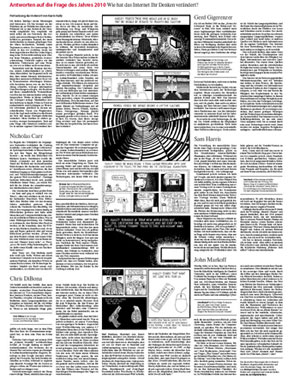

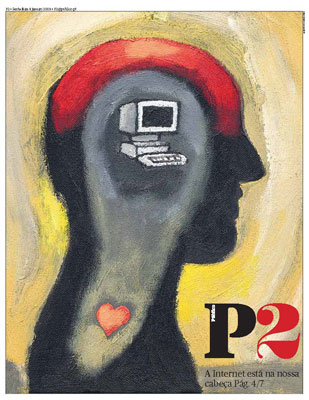
 Thinking in the Internet Age
Thinking in the Internet Age